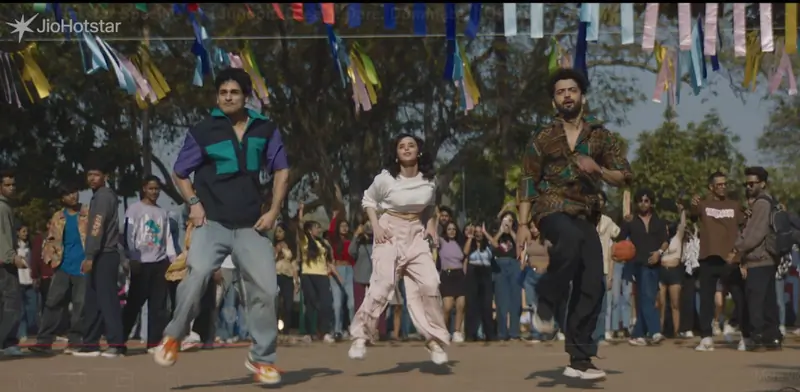'Hai Junoon' Review: A Youth Drama That Grooves, Trips, and Tries Too Hard
This lack of narrative finesse becomes one of the show's most persistent problems. Whenever Hai Junoon flirts with nuance or attempts a layered progression, it almost immediately caves in to the need for overstatement.
Published: Friday,May 16, 2025 07:08 AM GMT-06:00

Hai Junoon
Streaming on JioHotstar
Rating - **1/2 (2.5/5)
Cast: Neil Nitin Mukesh, Jacqueline Fernandez, Sumedh Mudgalkar, Siddharth Nigam, Priyank Sharma & more
Directed by: Abhishek Sharma
Created by: Aditya Bhat
Written by: Ankit K. Sharma, Vivian Chettiar, Rajdeep Ghosh, Nishank Verma, Sumedha Dogra, Aditya Bhat
Just why do dance-based and, more so, youth-centric shows and films in our country so often descend into hollow, box-ticking exercises rather than meaningful explorations of generational ethos and shifting cultural dynamics? It’s a disheartening trajectory, really. An innings where only a slim fraction of youth-focused narratives have managed to hit it out of the park. Narrow that down further to the dance sub-genre, and the ratio becomes even more pitiful. What we often get is a rehash of a well-worn blueprint. Something that was done with some flair in ABCD: Any Body Can Dance, fumbled in ABCD 2, and taken to an almost parodic level in Street Dancer 3D. Cue the dance-offs, the underdog arcs, the obligatory mentor figures, and a few shadowy villains lurking in the wings. You know the drill.
Amidst this déjà vu storm enters JioHotstar's latest offering Hai Junoon, a series that tries, and perhaps tries a little too hard. Successful or not? Let’s unpack that.
To give it due credit, Hai Junoon does make a conscientious effort to rejig the formula in applaudable ways. Instead of the usual format of dance troupes battling it out in over-stylised arenas with camera work doing more footwork than the performers, here we have a recalibrated premise. The clash isn’t just pirouettes versus flips. Rather, it’s the SuperSonics, an elite group of already-successful young singers at Anderson’s College, locked in a head-to-head with the Misfits, a collective of rebellious, rhythm-fuelled dancers who seem to live, breathe, and fight through movement.
The relentless barrage of ‘dude’, ‘bro’, and ‘girl’ begins to grate not just because of frequency, but because the performers themselves seem stuck in a linguistic loop they can't quite transcend. It's less organic, more performative, and over time, rather off-putting.
-

However, this duel isn’t even the narrative’s apex moment. Oddly enough, you find yourself barely invested in the competition at all. What manages to latch onto your attention are a few select character arcs more so than the overarching rivalry. The show boasts a sprawling ensemble of fresh faces and budding talents, many of whom perform with a sincerity that’s palpable. Sumedh Mudgalkar, in particular, deserves a spotlight of his own. Having long carried the weight of mythological iconography as Lord Krishna, he clearly approaches this role with the intent of breaking free and does so with conviction. Here, he gets to inhabit a more textured persona: flawed, fiercely driven, intensely passionate, and at times leaning into morally ambiguous terrain. Of course, his well-established dancing acumen doesn’t hurt either. And yes, he shines.
But where there is light, there are also the inevitable shadows.
The trouble with a youthful ensemble is that it’s a double-edged sword. Their unrefined authenticity often works wonders in moments of emotional veracity, but when it comes to anchoring heavier dramatic arcs, the cracks begin to show. One can’t help but notice that the dialogue delivery begins to strain under the weight of excessive slang and colloquial lingo. The relentless barrage of ‘dude’, ‘bro’, and ‘girl’ begins to grate not just because of frequency, but because the performers themselves seem stuck in a linguistic loop they can't quite transcend. It's less organic, more performative, and over time, rather off-putting.

Then there’s the classic case of what we might call performative inclusivity. A sincere yet clunky attempt at ticking the representation boxes. The show brings in themes of sexual identity, disability, and complex interpersonal relationships, but instead of folding them fluidly into the narrative fabric, they’re spelled out in bold font. Take Priyank Sharma’s character, for instance, a gay man navigating a landscape of judgment and tokenism. The intention is noble, but the execution falters. When he declares to a potential employer, “Meri sexual identity meri pehchaan hai, meri sexual identity ki wajah se hi aap mujhe hire kar rahe hai kyunki aapko bas dikhana hai,” it doesn’t come across as powerful. It feels scripted, almost didactic. There’s a way to make a point without drawing neon arrows around it, and sadly, Hai Junoon misses that subtlety.
This lack of narrative finesse becomes one of the show's most persistent problems. Whenever Hai Junoon flirts with nuance or attempts a layered progression, it almost immediately caves in to the need for overstatement. The result is a tonal inconsistency that jars with the very themes it aims to elevate. It’s as if the show doesn’t trust its audience enough to read between the lines.
Now let’s talk music, because one would assume a musical drama can’t afford to drop the beat.
Hai Junoon is a series that wears its heart on its sleeve, but perhaps to a fault. It brims with ideas. Some refreshing, some borrowed, and a few entirely unnecessary.
-

The series, to its credit, does pack an expansive soundtrack. That in itself is a risk. And while it’s not a full-blown disaster, it is far from cohesive. A few of the original tracks land effectively, especially when coupled with emotionally resonant visuals. There are moments where the song, choreography, and character arc converge meaningfully. However, these moments are often overshadowed by a barrage of remixed retro tracks that seem to exist purely for their recall value. The novelty of it wears off fast, and the repetition becomes distracting. Instead of enhancing the rhythm of the story, the music sometimes interrupts it.
Then come the marquee names. Neil Nitin Mukesh and Jacqueline Fernandez. Neil gets a meatier role here than he has in a while. Playing Gagan Arora, a celebrated musical virtuoso with a no-nonsense demeanour and a sharp distaste for the reckless abandon of youth, Neil gets to straddle a grey area. He isn’t a villain, but he isn’t exactly charming either. Interestingly, while Neil does manage to hold your attention, there's a latent anticipation that Gagan will pivot into a full-blown antagonist. Likely a consequence of Neil’s history of playing morally dubious characters. That tension, whether intended or not, adds an intriguing layer.
Jacqueline Fernandez, meanwhile, continues her streak of being impeccably poised and dazzling on screen. While her character is given some emotional layering, it doesn’t quite come alive in her performance. She glides through the role with grace, yes, but with limited emotive depth. Her casting feels more functional than transformative.

On the brighter side, one casting decision that truly clicks is Siddharth Nigam as Bikram. There’s something immediately compelling about his portrayal. A mix of vulnerability, aspiration, and quiet strength. His character ends up becoming the audience’s most reliable conduit into the chaos. Bikram's innocence and burning desire to carve a place for himself feel grounded and accessible. Sure, one has to stretch their imagination a bit to accept Nigam as a gifted vocalist, but in the spirit of suspension of disbelief, you go along for the ride.
Ultimately, Hai Junoon is a series that wears its heart on its sleeve, but perhaps to a fault. It brims with ideas. Some refreshing, some borrowed, and a few entirely unnecessary. Its commitment to scale and spectacle is evident, but somewhere along the way, it loses the emotional anchor. The narrative is stuffed with twists and dramatic spikes that prevent the story from marinating long enough to leave a lasting impact. It’s almost like the show is in a constant rush to be profound, without taking the necessary pause to actually be profound.

What Hai Junoon becomes, then, is a case study in potential left unrealised. It has its moments. Flashes of brilliance, segments of engagement, and instances where you see the better show it could have been. But overall, it ends up being a half-baked dish that looked promising on the menu but arrived undercooked on the plate.
In an era where content fatigue is real and attention spans are dwindling, Hai Junoon had the opportunity to be a breakout voice for a generation. Instead, it ends up echoing many of the clichés it probably set out to dismantle. There is still some fun to be had, and a few characters may earn your investment, but the larger vision crumbles under the weight of its own ambition.
Watch it if you’re curious. Skip it if you’ve already seen this dance before.
Join Our WhatsApp Channel
Stay updated with the latest news, gossip, and hot discussions. Be a part of our WhatsApp family now!
Join NowYour reaction
 Nice
Nice Great
Great Loved
Loved LOL
LOL OMG
OMG Cry
Cry Fail
Fail






















1 Comment